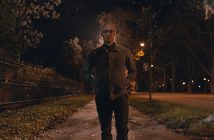Editor’s Notes: The following article is part of our coverage of the Locarno International Film Festival. For more information on the festival visit pardolive.ch and follow the Locarno International Film Festival on Twitter at @FilmFestLocarno.
Things got to yet another slow start on Monday—what has to be done to get something light and energetic to kick off a day’s screenings?—with Albert Serra’s Story of My Death, widely referred to about town as “Casanova meets Dracula”, as appealing a conceit as any other the programme had to offer. Speaking on Sunday about his films—known for their slow pacing, strange atmospheres, and script-free storytelling—in relation to critical reception, the Catalan director claimed that whether a lover or hater, nobody could say the new movie isn’t interesting. To which I say yes I bloody can: the idea is interesting, a fascinating collision of these icons and the respective historical eras they embody, yet when treated with Serra’s agonising blend of overbearing potty humour and austere art house sensibilities it rapidly casts away all potential and becomes instead a trite and tedious tale of annoying people walking about for a very long time. Serra’s artistic achievements are often enormous, his saturated frames and soothing music a beautiful blend indeed; if only his point were half as detailed.
Lighter fare followed in the form of Claire Simon’s second film playing here at Locarno this year: Human Geography. Offering an intriguing counterpoint to the narrative Gare du Nord, this documentary adopts the same central Parisian train station as its setting, but instead explores the real lives with inhabit it and the cross-section of humanity it represents, Simon and a friend taking their time to get to know the lives that give this place its character. Simon has done something special here, her respective movies espousing the merits of opposite modes of cinematic storytelling in a bid to reveal—of course—that they’re really not so opposed at all. Neither film is particularly great as an individual entity: taken together, their points of intersection and divergence present an invaluable portrait of the fallacy of such binary distinction. Cinema is a dynamic, amorphous medium. To attempt to impose upon it strict categories of fiction and non-fiction is to deny the versatility of the world around.
Though Simon touches briefly on some difficult issues with Human Geography, it’s a relatively easy watch, especially when followed by an experience as intense and unaccommodating as the delectably-titled The Strange Colour of Your Body’s Tears. A brilliant, bloody, brutal neo-giallo nightmare, it’s horror cinema at its most oppressively visceral and yet profoundly cerebral too, a masterful mingling of the best of both worlds. Further praise to be found in my full review.
It’s a while since a movie so directly attested the incredible strengths of contemporary South Korean cinema as The Stone, which opened proceedings on Tuesday. That’s not to say it’s some exemplary film, but rather to tout the achievement it makes in crafting a consummately engaging thriller of—essentially—long sequences of board games being played. It’s the story of Min-su, whose skill at the popular game Go earns him a position as tutor to a top crime boss. Moral complexities aplenty follow as the youngster finds himself unwittingly embroiled in the dark underworld and the traumas of his own past are brought to the surface. Cho Dong-in’s is a terrifically stoic lead performance, perfectly playing on the prominent duality of the film’s title. There’s a depth of drama to be found here that’s undoubtedly moving, but it doesn’t mask the rich humour that makes the movie such a joy to behold, such a relentlessly fun viewing experience.
“A relentlessly fun viewing experience” is certainly not a quote you’ll see on any poster for Sangue, Pippo Delbonno’s immensely personal documentary chronicling the release of a Communist executioner after twenty years’ imprisonment. Immediately comparable, of course, to The Act of Killing, it’s a film complicated by the fact that its director and subject are really good chums. There’s something distinctly discomfiting in seeing Delbonno and the murderer he seeks to profile gaily arguing over the car’s GPS; what a bizarre conflict of interest this is, leaving Delbonno quite happy to nod along as his interviewee claims he’s a good man now. Perhaps it’s a good thing, then, that the movie uproots itself halfway in and hops on a plane to visit Delbonno’s dying mother: it may be a wild abandonment of subject matter, but it’s at least a reprieve from the troubling whitewash to which we’re previously made privy. There’s real emotion to be found in the hour we spend with Delbonno’s mother across her dying days, if not enough to overcome the fact that this has nothing at all to do with the film’s ostensible focus. What a baffling mess of a movie this is; competition entries don’t come more undeserving.
Dampened spirits were lifted to unprecedented heights as the day continued with a Doug Trumbull masterclass. In town to collect the inaugural Vision Award, the 2001: A Space Odyssey and The Tree of Life special effects guru talked lengthily and lovingly of his career on the fringes of Hollywood and the bold new directions in which he intends to take the cinematic experience. Despite the visionary technologies dismissed at every turn, his less than fortuitous career has never kept Trumbull down long, and every tale of refusal was spun with an amusing little anecdote and a wry smile that said clearly: “I was right”. History will show—already has, in fact—that this is a man who saw the future. What a joy to hear of his experiences first-hand. See here for a more in-depth account of the unending anecdotes he provided.
Whether it was the sense of elation so inspiring a talk provoked, the peculiar pairing of mood and movie that comes along every now and then, or just the fact that it’s really good, I emerged from Distant knowing I had seen my film of the festival. Free of dialogue and formed of only thirteen shots, it’s a movie I’d never dare to claim as of universal appeal; for these eyes, though, it worked wonders, and the simple but sublime things it has to say about humanity told me more than any other film this past week. Read the full review here.
It would be unfair for any film to have to follow that act; for Coast of Death it was doubly so, being as it is a similarly shot and structured work. Set around the titular Galician locale, it quietly follows the comings and goings of the small community who call it home. Here observing the fisherman who stand atop rocks near-buried by waves, there listening in on the gossip of local women, it’s a visually stimulating and gently engrossing film that suffers perhaps from carrying on just a little too long. Its greatest problem is the curious sense of construction it carries; what few exchanges there are feel oddly expository, as though scripted to inform an international audience of the geographical and social nature of this area. Still, director Lois Patiño’s wowing tableaux make for plentiful pretty pictures to make a visual feast of Coast of Death, if not a terribly long-lingering one.




